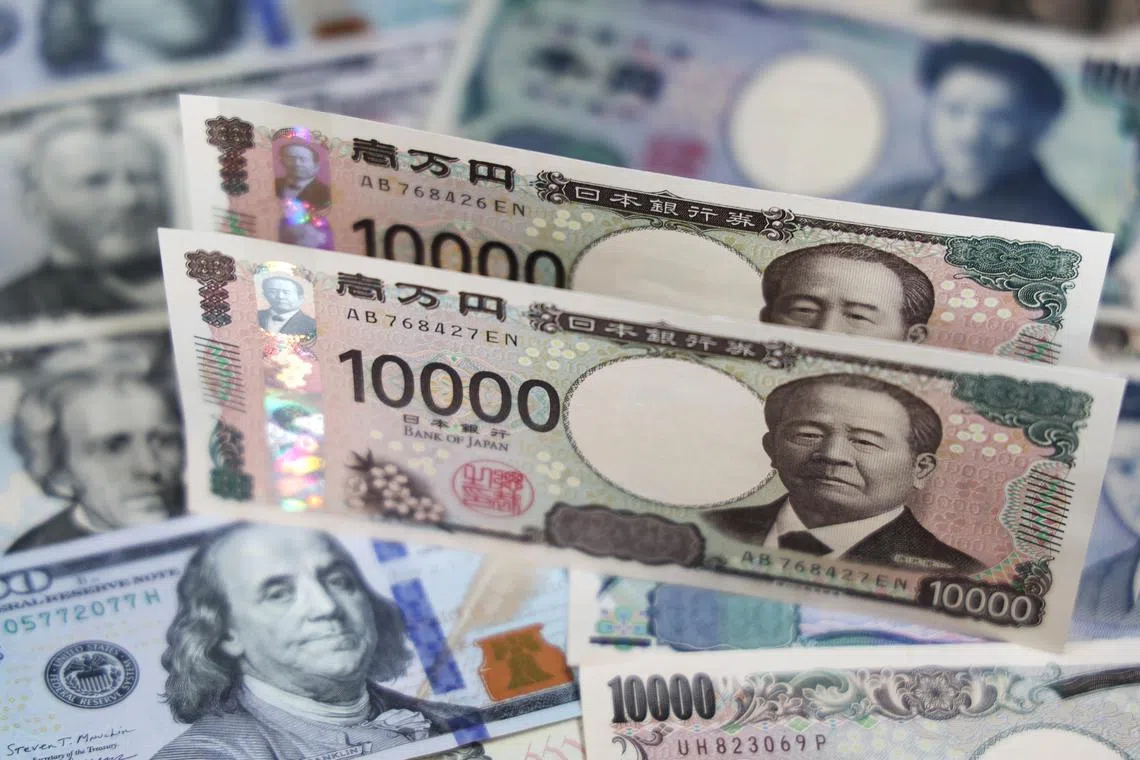Yen weakens against Singdollar as Ishiba’s resignation threatens long bond sell-off
Sign up now: Get ST's newsletters delivered to your inbox

The yen weakened against the Singapore currency, falling 0.6 per cent to 115.3911 per Singapore dollar.
PHOTO: LIANHE ZAOBAO
Follow topic:
TOKYO - Japanese markets face the prospect of more instability as investors prepare for the departure of Prime Minister Shigeru Ishiba
The yen slid as much as 0.8 per cent against the US dollar on Sept 8, before paring losses to trade down 0.3 per cent. Japanese shares rallied thanks to the positive tailwind from the weaker yen.
The Japanese currency also weakened against the Singapore dollar, falling as much as 0.6 per cent to 115.403 in the morning, before recovering some ground.
It was down 0.3 per cent at 115.067 per Singdollar as at 3.48pm Singapore time.
Long-maturity Japanese sovereign bonds stand out as being particularly vulnerable to selling when that market gets under way later in the morning, given heightened concerns over government spending. The rally in US Treasuries on Sept 5 has some potential to temper the initial moves in Japanese debt on Sept 8.
Although expectations for Mr Ishiba’s eventual departure have been present following his ruling party’s poor election showing in July, traders are still trying to determine how much fiscal stimulus may come with potential successors, and to what degree any change could slow the next interest rate hike from the Bank of Japan (BOJ).
“With the LDP (Liberal Democratic Party) lacking a clear majority, investors will be cautious until a successor is confirmed, keeping volatility elevated across yen, bonds and equities,” said Ms Charu Chanana, chief investment strategist at Saxo Markets in Singapore.
“Near-term, that argues for a softer yen, higher JGB (Japanese government bond) term-premium, and two-way equities until the successor profile is clear.”
Any further spike in JGB yields would be of concern to global markets, which have been on guard for more spillover from Japan into debt trading in Europe and the US.
The yields of longer-term bonds have been rising on renewed fiscal concerns across major economies.
“While it remains unclear who will become the next prime minister, it’s difficult to envision anyone with a fiscal discipline stance better than or even equivalent to his,” said Sumitomo Mitsui Trust Asset Management senior strategist Katsutoshi Inadome, referring to Mr Ishiba.
“The weak performance of ultra-long-term bonds, driven by fiscal concerns, is likely to persist or even intensify.”
The yen, which ended last week around 147.43 to the US dollar, is likely to slide towards the 149.1 or 149.2 level, said Mr Tony Sycamore, an analyst at IG in Sydney. It traded at 148.21 as at 7.25am in Tokyo.
Mr Nick Twidale of ATFX Global Markets sees a chance that a BOJ rate hike comes off the table in 2025 because of the political backdrop. The yen will be “whippy and horrible to trade”, said Mr Twidale.
“Rates traders will also be facing heightened risk.”
Gaitame.com Research Institute’s head of research Takuya Kanda had already warned on Sept 5 that the yen was in danger of falling all the way back to 150 given the nation’s political backdrop.
Views were mixed on Japanese shares, which would normally be expected to benefit from any more fiscal stimulus and a weaker yen.
“In the Japanese equity market, uncertainty over the political outlook is expected to ease somewhat, leading to a temporary rise,” said Mr Jumpei Tanaka, head of investment strategy at Pictet Asset Management Japan. Then, attention is likely to shift to who will become the next prime minister, said Mr Tanaka.
Japanese stocks may fall at the open on Sept 8, partly owing to the impact of US employment data, according to Mr Hiroshi Namioka, chief strategist at T&D Asset Management. He added that Mr Ishiba’s resignation had been somewhat anticipated, but not fully priced in. BLOOMBERG

